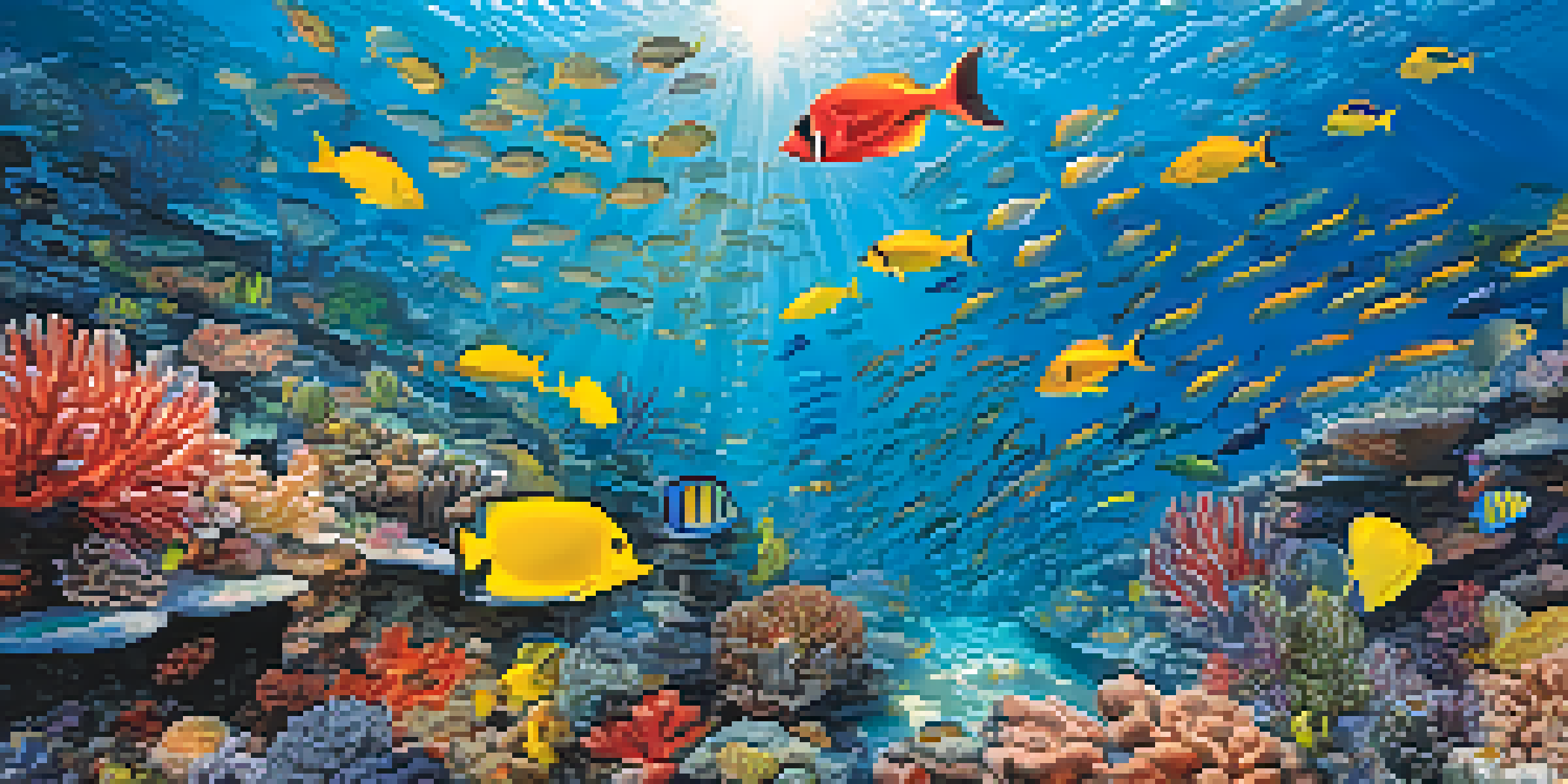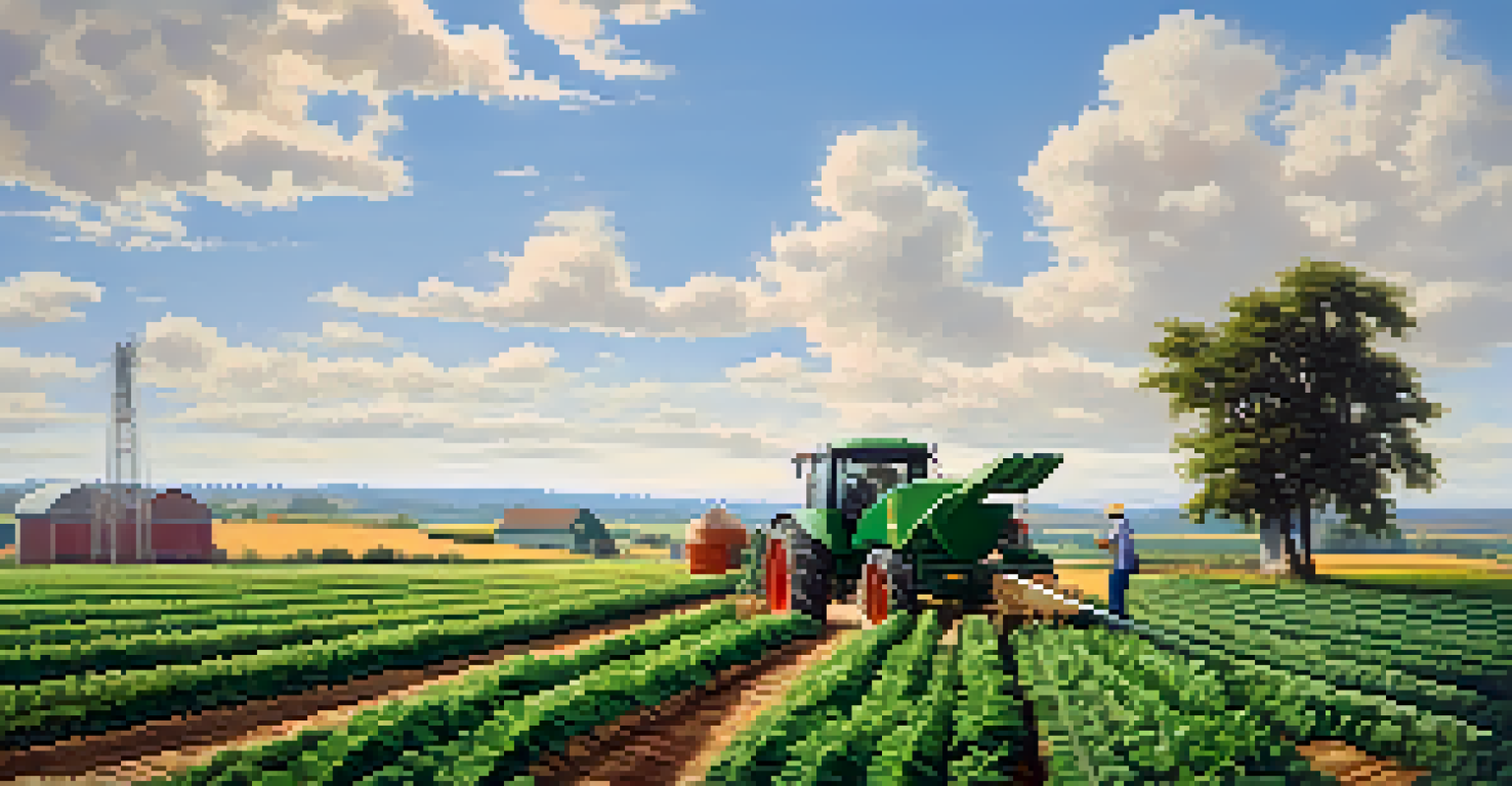The Role of Veganism in Reducing Ocean Pollution Levels

Understanding Ocean Pollution and Its Sources
Ocean pollution is a pressing global issue, primarily caused by human activities. From plastic waste to agricultural runoff, various factors contribute to the degradation of marine ecosystems. One major source of pollution is the fishing industry, which not only leads to overfishing but also generates significant waste. Reducing reliance on animal products can be a key step in mitigating these impacts.
We won't have a society if we destroy the environment.
The agricultural practices linked to animal farming often involve heavy use of fertilizers and pesticides, which can wash into rivers and eventually flow into the ocean. This runoff can lead to harmful algal blooms that deplete oxygen levels, creating dead zones where marine life cannot survive. Understanding these sources is crucial for anyone looking to make a positive change for our oceans.
By shifting towards a vegan lifestyle, individuals can help reduce the demand for animal agriculture, thereby lessening pollution levels. This shift not only benefits the oceans but also promotes a more sustainable food system overall.
The Impact of Animal Agriculture on Marine Ecosystems
Animal agriculture plays a significant role in ocean pollution, contributing to both water contamination and habitat destruction. Feedlots and factory farms generate immense amounts of waste that can seep into local waterways. When this waste enters the ocean, it can lead to nutrient pollution, which disrupts marine ecosystems and threatens biodiversity.

Additionally, the fishing industry itself contributes to pollution through practices like trawling, which can destroy ocean floors and habitats. Bycatch, the unintended capture of non-target species, further exacerbates the problem, as discarded fish and marine life contribute to waste. Reducing our consumption of fish and other animal products can help alleviate these pressures.
Veganism Reduces Ocean Pollution
Adopting a plant-based diet can significantly lessen the demand for harmful animal agriculture, which is a major contributor to ocean pollution.
By adopting veganism, individuals can lessen the demand for harmful agricultural practices, promoting cleaner oceans and healthier marine life. Every small change in dietary choices can lead to significant positive impacts on our oceans.
Veganism: A Sustainable Solution for Ocean Health
Veganism offers a sustainable alternative to traditional diets that heavily rely on animal products. By choosing plant-based foods, consumers can support agricultural practices that are less harmful to marine environments. Sustainable farming methods, such as crop rotation and organic farming, can help reduce runoff and promote healthier ecosystems.
The greatest threat to our planet is the belief that someone else will save it.
Moreover, a plant-based diet requires fewer resources like water and land, which further mitigates environmental stress. For instance, producing plant proteins typically generates less pollution compared to raising livestock. By recognizing the benefits of a vegan lifestyle, individuals can contribute to a healthier ocean and planet.
Additionally, embracing veganism can inspire others to reconsider their dietary choices, creating a ripple effect in communities. The more people choose vegan options, the more demand shifts toward sustainable practices, ultimately benefiting ocean health.
Reducing Plastic Waste through Vegan Choices
Plastic pollution is another critical issue affecting our oceans, and surprisingly, veganism can play a role in reducing this waste. Many animal products are packaged in plastics, contributing to the growing problem of single-use plastics. By opting for plant-based foods, consumers can reduce their reliance on these heavily packaged items.
Moreover, many vegan products come in more sustainable packaging, such as glass or compostable materials. This shift not only reduces plastic waste but also encourages companies to adopt eco-friendly practices. By making conscious choices, individuals can help lessen the burden of plastic pollution on marine ecosystems.
Animal Agriculture Destroys Habitats
The practices associated with animal farming generate waste and nutrient pollution that disrupt marine ecosystems and threaten biodiversity.
In essence, every vegan meal contributes to a larger movement towards sustainability and ocean conservation. Embracing a plant-based diet can be a powerful tool in fighting against the tide of plastic waste that threatens our oceans.
Promoting Awareness and Education on Ocean Health
Raising awareness about the connection between diet and ocean health is crucial for fostering change. Many people may not realize that their food choices can significantly impact marine environments. By promoting education on this topic, we can empower individuals to make informed decisions that benefit the oceans.
Social media platforms and community events can be effective channels for spreading the message about veganism's role in reducing ocean pollution. Sharing informative content, personal stories, and tips for adopting a plant-based lifestyle can inspire others to join the cause. The more knowledge we share, the more momentum we can build towards healthier oceans.
Ultimately, creating a community focused on sustainability and ocean conservation can lead to lasting change. By working together, we can amplify our voices and make a significant impact on ocean health through our dietary choices.
The Role of Policy in Promoting Veganism for Ocean Health
Government policies play a pivotal role in shaping agricultural practices and promoting sustainable diets. By supporting policies that encourage plant-based agriculture and reduce the environmental impact of animal farming, we can create a more sustainable food system. This, in turn, can lead to healthier oceans and ecosystems.
Advocating for subsidies for plant-based farming and research into sustainable practices can help shift the focus away from animal agriculture. Additionally, implementing regulations on plastic packaging and waste management can further protect marine environments. Engaging with policymakers to prioritize ocean health in food systems is essential for long-term change.
Policy Supports Sustainable Diets
Government policies that promote plant-based agriculture can lead to healthier oceans by reducing the environmental impact of animal farming.
As citizens, we can also influence these policies through our voting choices and advocacy efforts. Supporting initiatives that promote veganism and sustainable practices can drive the change we want to see in our oceans.
A Call to Action: Embracing Veganism for Ocean Conservation
In conclusion, the connection between veganism and ocean pollution is more significant than many realize. By embracing a plant-based lifestyle, individuals can contribute to reducing ocean pollution levels and promoting healthier marine ecosystems. Every choice counts, and adopting veganism is a powerful way to make a positive impact.
As more people recognize the benefits of veganism for the planet, we can build a collective movement towards sustainability. Whether it's by choosing plant-based meals, reducing plastic use, or advocating for policy changes, everyone can play a role in ocean conservation. It's time to take action and support a lifestyle that prioritizes the health of our oceans.

Together, we can create a wave of change that not only protects marine life but also fosters a more sustainable future for our planet. Let's embrace veganism and make a difference for our oceans and the environment.